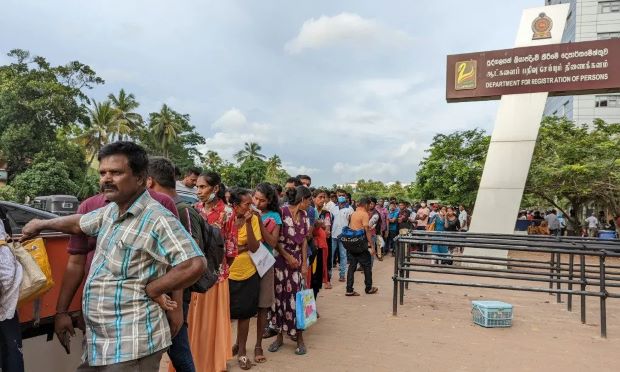‘I must stay strong’: hardship for workers fleeing Sri Lanka’s broken economy
For many, leaving their country and their family behind to earn money overseas is the only option
By Aanya Wipulasena
COLOMBO – Suvendra Mary has not changed her clothes, nor has she had a decent meal in five days.
Last week, she and six other women boarded a bus from their home town, Badulla, about 350km from Colombo, and arrived at the Department of Immigration and Emigration in hope of applying for their passports. Since then, the women have been sitting in a queue of at least a thousand others dreaming of leaving Sri Lanka.
Mary is hoping to find work as a housemaid in Saudi Arabia. Her only goal is to send money home to her family who are feeling the brunt of the worst economic meltdown to hit the country since it gained independence from the British in 1948.
The seriousness of the situation was laid bare by Prime Minister Ranil Wickremesinghe on Wednesday (22) when he told Parliament that after months of shortages “our economy has completely collapsed”.
“I thought we will be able to get our passports in a day but now we are staying in this queue for several days,” said Mary, 41. “When it rains, we sit under umbrellas. When it is too sunny, we sit under umbrellas. We don’t leave our spot. If we leave someone else will take it.”
These days, people staying in queues for days to purchase fuel and cooking gas is a common sight. Headline inflation year-on-year shot up to 45.3% by May this year. The Sri Lankan government is struggling to find sufficient foreign currency to import essential goods, while protests continue across the island demanding President Gotabaya Rajapaksa resign.
A team from the International Monetary Fund (IMF) is in Sri Lanka to negotiate a bailout. But for people like Mary, leaving seems to be the only option to beat poverty.
According to government statistics more than 329,000 people have applied for passports from January to June 15 this year. Last year 382,504 passports were issued and in 2020 the number was 207,692.
Chinthaka Pushpakumara, a 39-year-old father and housekeeping supervisor from Polonnaruwa, situated about 227km from Colombo, said he wanted to leave so his three children would have a better future. But he was worried about leaving them behind.
“It was not an easy decision to make. My youngest is only one and a half years old. I must stay strong, if not my family will suffer,” Pushpakumara said.
He is not the only tourism industry worker to leave Sri Lanka, which relies heavily on tourism income. Sanath Ukwatte, the former president of the Hotel Association of Sri Lanka, said the industry had lost about 15,000 professionals.
“There is more to leave. We [hotel owners] are very worried, but we can’t force them to stay. We are facing a challenging period right now,” he said. Most of the tourism industry professionals are seeking work in the Maldives, as well as in Dubai, Qatar, or elsewhere in the Middle East.
Sri Lankans seeking overseas work are mostly semi-skilled workers such as plumbers, drivers and mechanics. The government this year has already sent 138,460 registered workers abroad compared with 122,321 last year. Many more have left unregistered.
Manusha Nanayakkara, Minister of Labour and Foreign Employment, said Sri Lankans going overseas for work was a good thing as the country needed foreign remittances. He said shops and other small-scale businesses were closing, pushing many out of jobs.
On June 20, the Cabinet of Ministers passed a proposal to bring down the legal age of women working as housemaids abroad from 25 years of age to 21, to encourage all migrant workers to register with the government.
However, leaving home is not always an easy decision. A video shared on social media recently is engraved in Pushpakumara’s mind. “It was a video of a little child calling his father when he was leaving for work. I couldn’t watch the video till the end. I switched my phone off. I know I must stay strong.”
-theguardian.com
Long queues at the Department of Immigration and Emigration in Battaramulla, Sri Lanka. Photograph: Aanya Wipulasena


